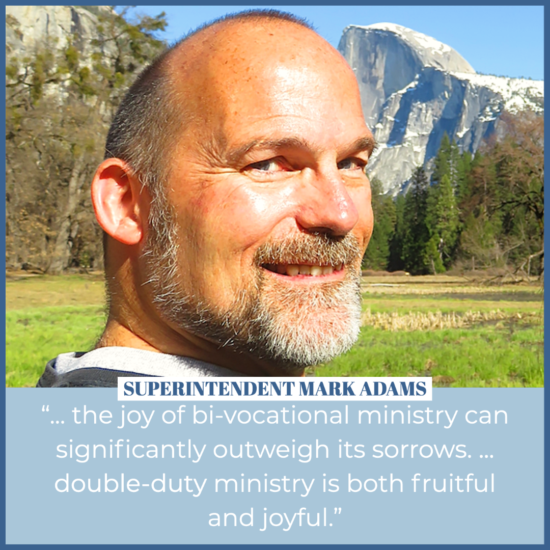
Another exhausting day at work is nearly over. I text my long-suffering wife as I navigate through an exhaust-choked rush hour toward another late dinner. Late because I stop at the hospital on the way home to pray with and encourage the Smiths as they watch their son lose his battle with leukemia. My kids have already eaten and are tucked into bed hoping for a bedtime story from pops. It’s a short story. I’m tired. She invites me to relax on the couch for the evening news and conversation. Laptop open, prepping for tomorrow’s small group, I think I replied with the appropriate yes or no to my beloved’s vocal inflections. I don’t remember the content of our “talk.”
Normal for a bi-vocational pastor is seven long days a week, juggling competing, valid expectations from your spouse, children, secular boss(es), congregation, superintendent, community leaders and fellow clergy. Burning brightly through this haze is the call of Jesus Christ to be a faithful disciple, proclaim good news, and make more disciples.
Today, I superintend the Free Methodist churches in Northern California and Nevada, but I served as a bi-vocational pastor and church planter for over a decade. I lived it. I loved the bi-vocational life.
Still, that was a while back, so I asked several bi-vocational pastors in our church network what they found to be struggle and joy in their calling today. More than half (64%) of our conference pastors are bi-vocational. They are young and seasoned, men and women, Black, White, Asian and Hispanic. Their answers and my experiences reveal that while dual-career ministry holds unique difficulties, you can be bi-vocational and love it – if you follow a few key practices.
The chorus of joy-killing concerns from these double-duty pastors are harmonized into one recurring note. Not enough time! Elvia Guido Cruz from San Jose says “time!” Henry Raven in Oakdale responds, “time coordination.” Mike Moresi from Fernley reveals, “Your work, home life, preaching, and ministry are in constant conflict.” Gayleen Myer in Santa Cruz reports, “feeling spread too thin.” Jim Crawford from Sacramento laments, “the inability to respond to ministry needs because of work commitments.” Not enough time, multiple competing demands, too few resources, a mind divided over multiple responsibilities, energy depletion – all agreed bi-vocational pastoring is hard.
Still, the joy of bi-vocational ministry can significantly outweigh its sorrows. With spirit-infused energy, incarnational perspective, healthy boundaries, family united, inherent cross-training, increased credibility, good planning, leadership development and expanded evangelistic connections, double-duty ministry is both fruitful and joyful. Living these nine secrets allows a pastor to be bi-vocational and love it.
Be Spirit-led. Those led by the Spirit of God are the children of God. Prayer is the essential first priority. No Christian can expect energy, joy, guidance, wisdom and sense of childlike wonder in the midst of crushing pressure to flow from a prayerless life. But life abundant flows from abiding in Christ. Start here or don’t start at all.
Be incarnational. Embrace each task at hand as an incarnational opportunity to glorify God. Pastor Gayleen, teacher/tutor/pastor, says, “Consider every job as a gift from God, ask God to use you where He has planted you. Instead of wishing for something different or longing to spend more time pastoring, ask how He can use you or shape you through your secular work.” Pastor Henry, mortician/social-worker/pastor, says, “I love the mortuary business, we work with people at their deepest point of need.” Elvia, pastor/chef says, “I’ve learned that God is everywhere, and I am serving God whether laboring for the church or in my kitchen.”
Set boundaries to be fully present. Regardless of the profession, time management is critical. Every physician, stay-at-home parent, teacher or landscaper could go 24/7 without being “finished” and lament the lack of time and energy. Many families have a mom, dad or both that must work two jobs simply to make ends meet rather than from a sense of divine call.
Choose to limit the time you invest in a particular role and be fully present in the moment. This gives peace and joy. Give yourself four hours a week, for example, to develop your sermon, and stop when the time is up. During those hours, give it your full, undivided attention. When you repair your customer’s transmission, embrace the life-giving measure to bring safety to the vehicle’s occupants and refuse to think about your next small group meeting. Choose a “date night” every week, or play time with your children, refusing calls from work. Focus fully and joyfully on one thing at a time.
Mike, dockworker/trucker/pastor says, “choose to love your home life, work life and church life, because many of the hobbies you might otherwise enjoy will need to be put aside.” I have worked many different jobs while pastoring; janitor, counselor, administrator, manager, social worker, and teacher. I always made time for my wife and children. As much as I or they would have liked? No employed person ever does. My primary sacrifices were movies, sports, television and other time wasters. Easy trades for purpose-filled joy.
Be a family on mission with Jesus. What’s not to love about helping set up an auditorium for worship, hosting a church game night, helping with lake-side baptisms, and having far more friends and social engagements than those not connected with church could ever imagine? Life on mission with Jesus is a good life for the whole family. Many of my four sons’ best memories are serving the homeless, welcoming refugees, learning instruments, setting up activities – as a family.
Leverage increased credibility. Elvia says, “I really know the needs and struggles of the people I minister to, which enables me to better gauge how I challenge and encourage my hard-working congregation.” Credibility climbs high when the pressed-on-every-side, exhausted people you lead know that you live in the same crucible. The bi-vocational pastor tends also to have greater compassion for their flock, rarely complaining over a church’s “lack of commitment” because they know the real sacrifices volunteers make to engage ministry. Pastor Henry says that by working outside the church, “my congregation has more motivation knowing I am not asking them to do anything I don’t do myself.”
Maximize the cross-training. Pastoral training and leadership positively benefit the secular work-place and vice versa. As the director of several residential group homes for people with disabilities, my pastoral training provided much higher morale in my departments over others in the agency I served. People respond well to kindness, love and respect, even as they are led and corrected. Likewise, the training I received in financial management, administration, leadership development and mental health counseling on the secular job are huge value-adds for church world. Both my secular work-place and the church I pastor are better-off as a result of “cross-training” between each sphere.
Planning leads to more joy, less stress. Every bi-vocational pastor experiences dredging their weary mental reserves for something meaningful to share while driving through traffic on the way to the meeting hall. This is ridiculously stressful and unhelpful for those served. Planning leads to joy.
I developed the practice of taking several days each year to plan out the next year, months and weeks. The first order of each day is fasting, prayer and searching the Scriptures, as well as reading something relating to best-practice. Sometimes joined by others from the church, I develop sermon-series plans and outlines, basic strategies for group development and leadership training, reprioritizing leadership investment and building family time into the schedule. My wife and kids could anticipate that, while perhaps I am uber-busy this week, next week we planned a beach day. Knowing I will preach on family life in two months means I have eight weeks throughout which I can snag tidbits and wisdom as I commute listening to audiobooks, tend to my work-mates real-life struggles and observe church interactions. I prep over months, not minutes. I am prepared, more confident and better equipped to feed the congregation well when I operate out of a plan.
Live to develop and deploy leaders. Everyone must learn that no one can do everything. Too many full-time pastors try to do it all. They serve but do not lead or grow their church. Bi-vocational pastors know they need others, regularly invite people to join them on mission, and tend to deploy others with more freedom to lead. Loving bi-vocational ministry only happens when you love to develop and deploy others for ministry more than doing everything yourself.
Win souls for Jesus. Pastor Mike in Fernley rejoices that nearly a third of his congregation is the result of work-related relationships. More than half of a church I planted were initially work-related converts and their connections. As a bi-vocational pastor I had far more daily evangelism opportunities than I ever had as a full-time pastor. Effective pastors must intentionally arrange their lives to be with those who have not yet heard the good news. Bi-vocational pastors have this opportunity built into each and every day.
Stress and difficulties, hard choices and seemingly impossible balancing acts are the norm in bi-vocational ministry. When these nine secrets are embraced, fruitfulness and joy are real. Sure, you don’t get to binge Netflix and still be effective, but the gain in tremendous. What’s not to love?
…
Pastors interviewed for this piece are:
James Crawford, Lead Pastor, God’s Family Christian Fellowship, Sacramento, California
Elvia Guido Cruz, Co-Pastor, Oasis Church San Jose, San Jose, California
Henry Raven, Lead Pastor, Sierra Foothills Christian Fellowship, Oakdale, California
Mike Moresi, Lead Pastor, Fernley Free Methodist Church, Nevada
Gayleen Myer, Assistant Pastor, Corralitos Community Church, Corralitos, California
About the Author
Mark Adams superintendents the Sierra Pacific Conference (Network of Undeniable Blessing), superintended the North Central Conference and church planted and pastored at several Chicagoland locations. Mark has also worked as a mental health counselor, child welfare worker, social work supervisor and was on faculty at Garret Evangelical Theological Seminary. He is married to Kerrie, and they have four sons and eight grandchildren.
